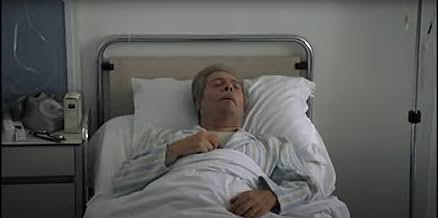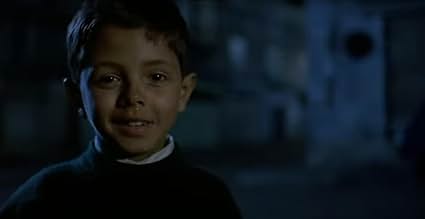IMDb-BEWERTUNG
7,7/10
4739
IHRE BEWERTUNG
Matteo beschließt, eine Reise quer durch Italien zu unternehmen, um seine fünf Kinder zu besuchen.Matteo beschließt, eine Reise quer durch Italien zu unternehmen, um seine fünf Kinder zu besuchen.Matteo beschließt, eine Reise quer durch Italien zu unternehmen, um seine fünf Kinder zu besuchen.
- Regie
- Drehbuch
- Hauptbesetzung
- Auszeichnungen
- 3 Gewinne & 3 Nominierungen insgesamt
Empfohlene Bewertungen
10clanciai
He lives in Trapani in the far west of Sicily and undertakes to look up all his five children around Italy to find out how they really are. It develops into an odyssey of constantly overwhelming human experiences, as his insight into his children's lives keeps opening up ever widening abysses. Marcello Mastroianni makes perhaps the greatest performance of his life, and he is curiously and appropriately matched with Michele Morgan in her last performance - this episode is brief but provides an oasis of refreshing relief in this heart-rending but magnificent story reaching in spite of all some very harmonising conclusion. The real underlying story is told in brief flashes of hints of understatements, and like Mastroianni you'll have nio idea of what it is all about until he finally has his children for a lunch in Rome, which was all he wanted but which did not turn out as he had imagined. Take care of this film, you will be in for revolting experiences that will not run off.
This film should not be missed, it's an amazing job by one of the best actors, Mr. Mastroianni has shown us what acting is all about. What a wonderful story... what a wonderful film!
Giuseppe Tornatore is best known for the excellent, Oscar-winning "Cinema Paradiso," but unlike that film, "Everybody's Fine" is rarely talked about. One of my all-time favorite actors, Marcello Mastroianni (8 1/2, La Dolce Vita, Big Deal on Madonna Street), plays Don Matteo, an aging Sicilian father of five who goes on a trip throughout Italy to try and visit all of his children. This is a trip of revelation for Matteo, who believes his children to be happy and wealthy. Gradually, the truth comes down.
Throughout the movie, Matteo is haunted by dreams of a beautiful Felliniesque day at a beach in which a caravan of horses are destroyed by an ominous descending black balloon that also steals his children. This isn't the only thing in the film that is inspired by Fellini, there are a LOT of things in here that echo the great Fellini's work (including a shot of a bus driving by our main character, it's passangers with their hands on the windows glaringly staring at him...GOOD STUFF).
It's a very warm, sentimental film, and I thought it was quite wonderful. Legendary composer Ennio Morricone's extraordinary score fits the film like a glove.
Throughout the movie, Matteo is haunted by dreams of a beautiful Felliniesque day at a beach in which a caravan of horses are destroyed by an ominous descending black balloon that also steals his children. This isn't the only thing in the film that is inspired by Fellini, there are a LOT of things in here that echo the great Fellini's work (including a shot of a bus driving by our main character, it's passangers with their hands on the windows glaringly staring at him...GOOD STUFF).
It's a very warm, sentimental film, and I thought it was quite wonderful. Legendary composer Ennio Morricone's extraordinary score fits the film like a glove.
This really is a wonderful film. Though at times it is hard to watch. All this kind man wants is to know that his children are happy and doing okay in their adult lives. One must pay close attention to each scene because in each of these scenes, one can find some sort of message that links the whole movie together. The most important scenes to look out for are the dream sequences and the flashbacks.
Guiseppe Tornatore's first film after the wonderful Cinema Paradiso got little attention when it came out and is not even available on DVD yet. Perhaps the increasing darkness of tone{ replacing the lightness of early scenes}of the film put people off,but now that we can all see Cinema Paradiso in it's director's cut {rather than the hacked up,simplified version that originally came out in 1989},this should not really be a surprise.
Again we have a film that celebrates life but asks questions about what is best in life,and whether we all make the right decisions. The movie centres on an absolutely wonderful performance by a 70 -odd Marcello Mastroiani,in a role that allows him the full gamut of emotions,from great joy to terrible sadness.
As before mentioned,the film is deceptively lighthearted at first. As Mastroiani travels from Rome to visit his children,Tornatore gives us some amusing and colourful snapshots of Italian life {or rather,life in general}. The observation with a touch of caricature recalls Fellini {another reviewer has pointed out the many similarities to Fellini so I will not repeat them all}. Particularly great is the lunatic who makes a sculpture out of.....aerials,some kind of statement about the evils of technological progress no doubt. Even here,more serious bits creep in,such as a surreal but very symbolic dream scene shown in several bits and an incredibly touching little moment where Mastroiani is in the same hotel room he spent his honeymoon night in and recalls that time.
As the film gets more serious and deeper it becomes a very poignant study of a man who feels lost,out of touch with everything,not just his children,who simply want the best for him but are actually somewhat embarrassed by him,but the world itself. These two elements reach their synthesis in a really haunting scene where Mastroiani,alone and homeless,spends the night in a box and visions of his children,as actual children,come to him. All this is seemingly resolved with just a bit of hope and happiness,than Tornatore delivers a killer of a punchline at the end which really makes us re access our views of Mastroiani's character.
As with {the full version of} Cinema Paradiso, and later on The Starmaker and {perhaps to a lesser extent}Malena,Everybody's Fine is sentimental but in a tough way. There is a great deal of emotion,both for the character's and for us,but its tempered with both a sense of realism and a wider sense of life and what is best for us in life.
With an absolutely superb score by Ennio Morricone,ranging from the jaunty,Baroque-like overture and 'travelling' theme to the tragic waltz for the 'hero',Everybody's Fine is a great film. Of course it's not as good as Cinema Paradiso,but are there many films that are? {I'm biased though,as it's my favourite film!}.
Again we have a film that celebrates life but asks questions about what is best in life,and whether we all make the right decisions. The movie centres on an absolutely wonderful performance by a 70 -odd Marcello Mastroiani,in a role that allows him the full gamut of emotions,from great joy to terrible sadness.
As before mentioned,the film is deceptively lighthearted at first. As Mastroiani travels from Rome to visit his children,Tornatore gives us some amusing and colourful snapshots of Italian life {or rather,life in general}. The observation with a touch of caricature recalls Fellini {another reviewer has pointed out the many similarities to Fellini so I will not repeat them all}. Particularly great is the lunatic who makes a sculpture out of.....aerials,some kind of statement about the evils of technological progress no doubt. Even here,more serious bits creep in,such as a surreal but very symbolic dream scene shown in several bits and an incredibly touching little moment where Mastroiani is in the same hotel room he spent his honeymoon night in and recalls that time.
As the film gets more serious and deeper it becomes a very poignant study of a man who feels lost,out of touch with everything,not just his children,who simply want the best for him but are actually somewhat embarrassed by him,but the world itself. These two elements reach their synthesis in a really haunting scene where Mastroiani,alone and homeless,spends the night in a box and visions of his children,as actual children,come to him. All this is seemingly resolved with just a bit of hope and happiness,than Tornatore delivers a killer of a punchline at the end which really makes us re access our views of Mastroiani's character.
As with {the full version of} Cinema Paradiso, and later on The Starmaker and {perhaps to a lesser extent}Malena,Everybody's Fine is sentimental but in a tough way. There is a great deal of emotion,both for the character's and for us,but its tempered with both a sense of realism and a wider sense of life and what is best for us in life.
With an absolutely superb score by Ennio Morricone,ranging from the jaunty,Baroque-like overture and 'travelling' theme to the tragic waltz for the 'hero',Everybody's Fine is a great film. Of course it's not as good as Cinema Paradiso,but are there many films that are? {I'm biased though,as it's my favourite film!}.
Wusstest du schon
- WissenswertesCameo Ennio Morricone as orquesta director of La Traviata.
- VerbindungenEdited into Lo schermo a tre punte (1995)
Top-Auswahl
Melde dich zum Bewerten an und greife auf die Watchlist für personalisierte Empfehlungen zu.
- How long is Everybody's Fine?Powered by Alexa
Details
Box Office
- Bruttoertrag in den USA und Kanada
- 1.745.470 $
- Eröffnungswochenende in den USA und in Kanada
- 18.367 $
- 2. Juni 1991
- Weltweiter Bruttoertrag
- 1.745.470 $
- Laufzeit1 Stunde 58 Minuten
- Sound-Mix
- Seitenverhältnis
- 1.66 : 1
Zu dieser Seite beitragen
Bearbeitung vorschlagen oder fehlenden Inhalt hinzufügen

Oberste Lücke
What is the Brazilian Portuguese language plot outline for Allen geht's gut (1990)?
Antwort


























